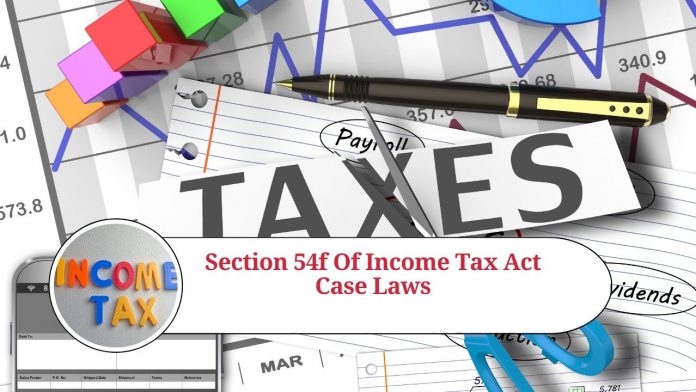Section 54F of the Income Tax Act, of 1961 provides relief to taxpayers from capital gains tax on the sale of a residential property, provided the sale proceeds are invested in a new residential property. The section has been subject to numerous disputes, leading to several landmark case laws.
Overview of Section 54F:
Section 54F provides an exemption from capital gains tax on the sale of a residential property, subject to certain conditions. The taxpayer must invest the sale proceeds in a new residential property within one year before or two years after the sale of the original property. Alternatively, the taxpayer can construct a new residential property within three years from the date of sale of the original property.
The exemption is limited to the number of capital gains or the investment, whichever is lower. Any unutilized sale proceeds must be deposited in a Capital Gains Account Scheme with a bank or other authorized institutions.
Case Laws on Section 54F:
The interpretation of Section 54F has been the subject of numerous disputes before the courts, leading to several landmark case laws. Some of the significant cases are discussed below.
- CIT v. Sambandam Udaykumar [2010]
In this case, the Madras High Court held that the term “residential house” used in Section 54F includes not only a single residential house but also more than one residential house, subject to the condition that the taxpayer must reside in any one of the houses. The court observed that the objective of the section is to provide relief to taxpayers who invest the sale proceeds in a residential property for their residence.
- CIT v. B.K. Gupta [2010]
In this case, the Delhi High Court held that the taxpayer must invest the entire sale proceeds in the new residential property to claim an exemption under Section 54F. The court rejected the contention of the taxpayer that the investment of a portion of the sale proceeds was sufficient to claim the exemption.
- Bajrang Lal Agarwal v. ITO [2014]
In this case, the Rajasthan High Court held that the taxpayer must invest the sale proceeds in a residential property for his residence to claim an exemption under Section 54F. The court observed that the objective of the section is to provide relief to taxpayers who invest the sale proceeds in a residential property for their residence and not for investment or commercial purposes.
- Jitendra Kumar Jain v. ITO [2015]
In this case, the Delhi High Court held that the taxpayer must invest the sale proceeds in a new residential property within the prescribed time limit to claim an exemption under Section 54F. The court rejected the contention of the taxpayer that the delay in investment was due to unforeseen circumstances beyond his control.
Conclusion:
Section 54F of the Income Tax Act provides valuable relief to taxpayers from capital gains tax on the sale of a residential property, subject to certain conditions. However, the interpretation of the section has been the subject of numerous disputes before the courts, leading to several landmark case laws. Taxpayers must be aware of the conditions and the judicial interpretation of Section 54F to claim the exemption correctly.
Read more useful content:
Frequently Asked Questions:
What is Section 54F of the Income Tax Act?
Section 54F of the Income Tax Act provides an exemption from capital gains tax on the sale of a residential property, subject to certain conditions.
What are the conditions for claiming exemption under Section 54F?
To claim an exemption under Section 54F, the taxpayer must invest the sale proceeds in a new residential property within one year before or two years after the sale of the original property. Alternatively, the taxpayer can construct a new residential property within three years from the date of sale of the original property. The exemption is limited to the number of capital gains or the investment, whichever is lower.
Can the exemption be claimed if the new property is not for residential purposes?
No, the exemption can only be claimed if the new property is residential and is used for the taxpayer’s residence.
What happens if the entire sale proceeds are not invested in the new property?
The exemption under Section 54F is limited to the number of capital gains or the investment, whichever is lower. Any unutilized sale proceeds must be deposited in a Capital Gains Account Scheme with a bank or other authorized institutions.
What is the time limit for investing in the new property?
The taxpayer must invest the sale proceeds in a new residential property within one year before or two years after the sale of the original property. Alternatively, the taxpayer can construct a new residential property within three years from the date of sale of the original property.
Can the exemption be claimed for multiple residential properties?
The exemption can be claimed for more than one residential property, subject to the condition that the taxpayer must reside in any one of the houses.
What is the role of case laws in interpreting Section 54F?
The interpretation of Section 54F has been the subject of numerous disputes before the courts, leading to several landmark case laws. Taxpayers must be aware of the conditions and the judicial interpretation of Section 54F to claim the exemption correctly.




















